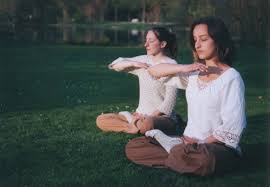Learning Falun Dafa is easy. The practice is simple, powerful, and absolutely free. The main principles of Falun Dafa are explained in their entirety in the book Zhuan Falun, and in the beginner’s text, Falun Gong, both written by Falun Dafa’s founder, Mr. Li Hongzhi. Also essential to the practice are the five gentle exercises, including a sitting meditation, which you can learn quickly and easily at any of the thousands of practice locations around the world. We invite you to discover the extraordinary practice of Falun Dafa for yourself. You can start by learning the exercises at your local practice site, and start learning the principles by downloading one of the books for free from this Web Site, or pick one up at your local library. What is Falun Dafa?Falun Gong (also called Falun Dafa) is an ancient form of qigong, the practice of refining the body and mind through special exercises and meditation. Like tai chi, qigong is a vital part of many people’s lives in Asia; almost every Chinese park is brimming by the break of dawn with people practicing these arts. Falun Dafa’s effectiveness in improving health and its profound principles have quickly made the practice immensely popular throughout the entire world. Since being introduced to the general public in 1992 by Mr. Li, Falun Dafa has attracted tens of millions of people in over 60 countries. Most major cities and universities in the United States, Canada, Australia, and Europe have English-speaking Falun Dafa practice groups. The people who practise Falun Dafa come from every imaginable walk of life, as Falun Dafa transcends cultural, social, economic, and national boundaries. The practice has spread largely by word of mouth, as those who learn it usually find the benefits simply too good to keep to themselves. Is Falun Dafa a religion?Falun Gong is not an institutional religion, as it does not have a professional and lay distinction; formal means of initiation; a formal creed; a religious calendar of observation; or devotional practices of worship, etc. The practice does, however, have a deeply spiritual doctrine and set of beliefs, and it does share in the same aspirations as groups more formally identified as religions, i.e., the cultivation of one’s moral self, the impulse to do good, a deepening of one’s understanding of a greater order in the universe, the will to spiritual perfection, etc. Falun Gong does have a set, standardized textual body of teachings. In this sense, as “religion” or “spiritual practice” is understood as a broader category in the West, Falun Gong qualifies. In China, Falun Gong did not identify itself as a form of religious practice, owing to different associations with the term in the context of China. Furthermore, to be identified as such would have been to incur government monitoring, increased regulation, and risk of disbandment. (“House Church” Protestants in China who do not join official, state-run “Patriotic Churches” are subjected to persecution for their religiosity, for example.) In the democratic West, however, where religions and religious beliefs are protected by law and carefully enshrined rights, the matter is of course different, and Falun Gong does not object to identification as a religious entity. 1. The Books and the Exercises 2. The Principles of the Practice 3. Is This for Me? To understand this practice and to learn why this practice is so powerful for practitioners’ health, and why it would be beneficial for you – please read the main guiding book for this practice: Zhuan Falun. To start learning the exercises, you can book a free online webinar via https://www.learnfalungong.org.au/. To start learning the exercises in person, please find a practise site here that is convenient for you to join – all practise sites are run by volunteers and are free to join. |
||

